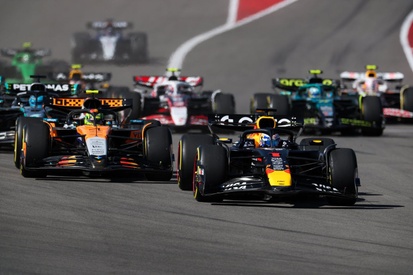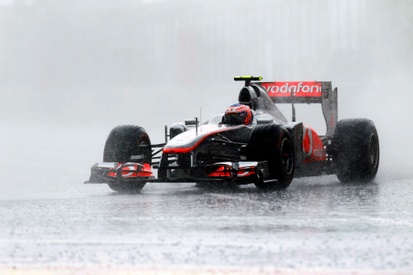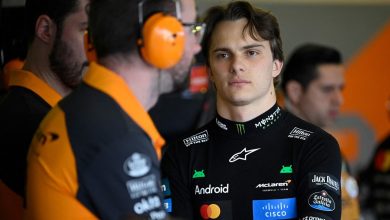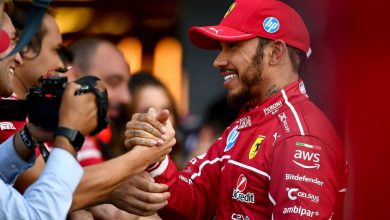Why Aston Martin is actively chasing the next generation of F1 mechanics

Nearly every Formula 1 squad has a full-sized junior team and academy programme right now, going down to go-karting in order to find the next great driving prospect. Off-track, a similar arms race is ramping up with burgeoning graduate programmes and apprenticeship schemes as teams look to replenish their staff pool with future talent.
Beating the other 10 teams to the brightest, most passionate young mechanics and engineers is one aim. The other is to replenish the crew travelling to most, if not all, of F1’s demanding 24-race schedule before family life, or the desire for a change of pace or position, drives some of them back to a factory-based role or to a different business altogether.
The Aston Martin squad has joined forces with its lubricant partner Valvoline to support its Aspiring Mechanics Programme, which aims to provide a five-year $1m purse to support an estimated 10,000 aspiring mechanics through scholarships and training. Valvoline is involved because the hunt for the next generation of mechanics isn’t limited to the F1 bubble, with the company estimating the global automotive industry is set to face a projected shortage of 4.3 million skilled workers by 2030.
The kick-off for its worldwide programme took place during the Mexico Grand Prix week, with Aston Martin team members meeting with students of the city’s Escuela Mexicana de Electricidad, eight of which were awarded scholarships.

Aston Martin F1 team members and Valvoline meet with students at the Escuela Mexicana de Electricidad
Photo by: Aston Martin Racing
Motorsport.com was in the room and saw how the 50-odd student corps was hanging onto Aston Martin team member Miguel Faisca’s every word as he explained the demands and allure of working in Formula 1. Students got hands-on with technical drawings and pieces of Aston Martin’s F1 car, before peppering Fascia with questions. The eight scholarship winners, two of which were female, were then invited for a paddock and garage tour on Friday at the Autodromo Hermanos Rodriguez.
“This is as good as it gets, so if this doesn’t inspire them then nothing will,” joked Andy Stevenson, Aston’s long-time sporting manager. Stevenson started his 35-year stint in F1 as a mechanic, entering the championship together with Jordan in 1991 after being the late Irishman’s mechanic back in F3.
“I was really lucky to get involved in this sport, because this has given me a huge amount of enjoyment and this is all through being a mechanic. It’s carved my life out for me, and [I’ve] met so many interesting people, and been to some really cool places. This is a phenomenal opportunity for these students. [I can’t imagine] if I’d had that opportunity when I was a kid, instead of trying to climb under fences at Thruxton to watch someone drive an F3 car on a rainy day…”
Despite being an F1 lifer, Stevenson is not one to sugarcoat the tough life of an F1 mechanic – 24 races plus testing, long hours, high pressure and extensive economy class travel. That means finding the right people with the right passion is important.
“To be a Formula 1 mechanic is a lot of incredibly hard work,” he acknowledged. “You’ve got to have an extreme amount of dedication, because there are a lot of sacrifices that you have to make. But the rewards are phenomenal. Even now, every single race I just get so much enjoyment and satisfaction out of what we do.”

Andy Stevenson, Sporting Director at Aston Martin F1 Team
Photo by: Zak Mauger / LAT Images via Getty Images
Despite the expanding calendar, Stevenson says F1 teams have gotten better at retaining people. “People are actually staying longer,” he explained. “The race team that we’ve got here with us hasn’t changed for the last four or five years. That never used to happen in the old days. I think it is because, as companies, we’re far more professional now. We understand life’s problems and we’re giving a lot more support to people.”
But attracting the next generation of staff is still a huge challenge, as a percentage of mechanics eventually decide to move on to a different role and a different pace of life. One way the Valvoline partnership is trying to alleviate the impending shortage is expanding the existing talent pool.
Aspiring mechanics in Mexico or other parts of the world might believe that working in F1 isn’t on the cards for them and see it as a distant dream. But the programme is hoping to prove otherwise.
“For us it’s extremely important, because none of us are getting any younger, and we’ve got a bunch of people in the garage now who are getting married, having families, and to be able to commit to the racing season is very difficult,” Stevenson explained.
“So we’ve got to have this young blood coming through, and this scheme is so cool because it gives us the opportunity to see these young kids early on and to point them in the right direction. It just opens up a huge pool of talent that would not have been available.
“I think a lot of kids when they’re watching F1 on TV think there’s no way they could be able to do that. This initiative allows them to say: ‘Actually, there is a chance and I can do that.’ We are always looking for good staff. It’s difficult to find them, because we obviously look for such a high standard, but this means that there will be more people available.”

Photo by: Aston Martin Racing
An additional hurdle is F1’s cost cap, which means teams don’t have unlimited resources to pour directly into staff salaries. It also compels organisations to start reaching out to talents before they even graduate to make sure they beat the competition to the best young starters on the job market, and then blood them in outside F1.
“The cost cap has tied our hands a little bit with bringing in lots of staff, because we’ve got to put them in the cap straight away,” Stevenson added. “We have a programme at Silverstone that we call F1 Evolution, which is where we run our older cars.
“We very much look to hire the younger people there so that we can train them outside of the cap, and when they’re ready we can bring them into the team. It also gives us another area people can go when they get older and don’t want to do all the races. They can go back, share their experience and help train up new people that we’re bringing in.”
Gustavo Schmidt, Valvoline global operations vice president of Latin America, hopes a successful start to the aspiring mechanics initiative in Mexico will be repeated elsewhere.
“We are very proud to be launching the programme here in Mexico, but the intention is to expand this programme to the rest of the world to impact thousands of mechanics through scholarships, training and tools,” Schmidt said.
“Bringing the students trackside to visit the garage and meet the people is a great experience to inspire them. Andy is a great example, and his partnership will help us end up with many more stories like his.”

Aston Martin F1 team members and Valvoline meet with students at the Escuela Mexicana de Electricidad
Photo by: Aston Martin Racing
We want your opinion!
What would you like to see on Motorsport.com?
– The Motorsport.com Team







